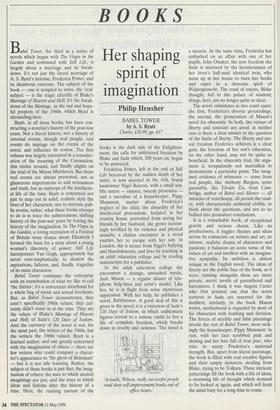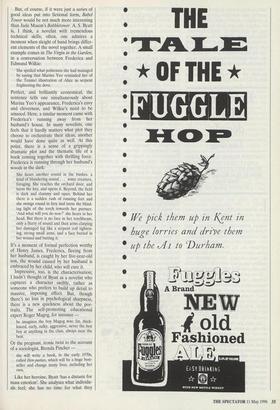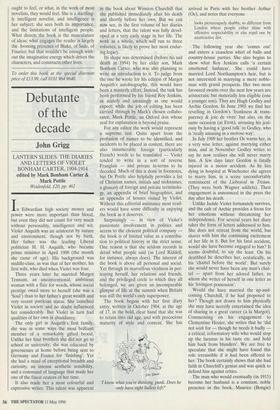BOOKS
Her shaping spirit of imagination
Philip Hensher
BABEL TOWER by A. S. Byatt Chatto, ┬Ż16.99, pp. 617 Babel Tower, the third in a series of novels which began with The Virgin in the Garden and continued with Still Life, is largely about a marriage and its break- down. It's not just the literal marriage of A. S. Byatt's heroine, Frederica Potter, and its disastrous outcome. The subject of the book ŌĆö one is tempted to write, the 'real' subject ŌĆö is the tragic afterlife of Blake's Marriage of Heaven and Hell; it's the break- down of the Marriage, in the sad and hope- ful projects of the 1960s, which Byatt is chronicling here.
Byatt, in all these books, has been con- structing a novelist's history of the post-war years. Not a literal history, nor a history of external events, though real people, real events do impinge on the events of the novel, and influence its course. The first volume was largely interested in a consider- ation of the meaning of the Coronation; this circles around, and finally alights on the trial of the Moors Murderers. But these real events are always presented, not as glamorous importations to add seriousness and truth, but as outcrops of the intellectu- al life of the time. Byatt is concerned not just to map out in solid, realistic style the lives of her characters, nor to recreate pub- lic events; rather, what these books attempt to do is to trace the subterranean, shifting history of the post-war years by tracing the history of the imagination. In The Virgin in the Garden, a loving recreation of a Festival of Britain verse drama about Elizabeth I formed the basis for a story about a young woman's discovery of power; Still Life incorporates Van Gogh, appropriately but never over-emphatically, to shadow the aspirations, failures, and, finally, tragedies of its main characters.
Babel Tower continues the enterprise with an examination of what we like to call `the Sixties'; it's a convenient shorthand for a whole bag of social and sexual freedoms. But, as Babel Tower demonstrates, they aren't specifically 1960s values; they cer- tainly didn't come in at the time. They are the values of Blake's Marriage of Heaven and Hell; of Sade's 120 Days of Sodom. And the currency of the novel is not, for the most part, the writers of the 1960s, but the writers the 1960s valued. Byatt is a learned author, and one greatly concerned with the imagination of others ŌĆö there are few writers who could compare a charac- ter's appearance to 'the ghost of Britomart' ŌĆö but it is not idle learning. Rather, the subject of these books is just that, the imag- ination of others; the uses to which ancient imaginings are put; and the ways in which ideas and fictions alter the history of a time. Here, the running current of the books is the dark side of the Enlighten- ment; the calls for unfettered freedom by Blake and Sade which, 200 years on, began to be answered.
Frederica Potter, left at the end of Still Life bereaved by the sudden death of her sister, is now married to the rich, brutal landowner Nigel Reivers, with a small son. His sisters ŌĆö sinister, tweedy presences and a succubus of a housekeeper, Pippy Mammott, mutter about Frederica's neglect of the child, the absurdity of her intellectual pretensions. Isolated in her country house, prevented from seeing her friends by her husband, she grows increas- ingly terrified by his violence and physical assaults; a chance encounter in a wood enables her to escape with her son. In London, she is secure from Nigel's bullying and blandishments, and lives by teaching in an adult education college and by reading manuscripts for a publisher.
At the adult education college she encounters a strange, unwashed mystic, Jude Mason ŌĆö a regular abuser of tele- phone help-lines and artist's model. Like her, he is in flight from some mysterious oppression. With her help, he publishes a novel, Babbletower. A good deal of this is given in the novel; it is a variation of Sade's 120 Days of Sodom, in which emblematic figures retreat to a remote castle to live a life of complete freedom, which breaks down in cruelty and violence. The novel is Actually, Wilson, really successful people read their self-improvement books out of office hours.' a success. At the same time, Frederica has embarked on an affair with one of her pupils, John Ottaker; the new freedom she finds is mirrored by the licentiousness of her lover's half-mad identical twin, who turns up at her house to burn her books and caper in a demonic spirit of Walpurgisnacht. The road of excess, Blake thought, led to the palace of wisdom; things; here, are no longer quite so clear.
The novel culminates in two court cases: the first, Frederica's divorce proceedings, the second, the prosecution of Mason's novel for obscenity. In both, the virtues of liberty and restraint are aired; in neither case is there a clear answer to the question of the limits of liberty. The liberty and sex- ual freedom Frederica achieves is a clear gain; the freedom of her son's education, on the other hand, may not be quite so beneficial. In the obscenity trial, the argu- ment is scrupulously not martialled to demonstrate a particular point. The imag- ined evidence of witnesses ŌĆö some from real people, like Anthony Burgess, some guessable, like Efraim Ziz, from Cam- bridge, author of Babel and Silence ŌĆö all miracles of ventriloquy, all permit the read- er, with characteristic authorial civility, to think about the questions, and not to be bullied into premature conclusions.
It is a remarkable book, of exceptional gravity and serious charm. Like its predecessors, it juggles themes and ideas across its comments on writers and art, its intense, realistic drama of characters and passions; it balances an acute sense of the values of art and intellect with an imagina- tive sympathy. Its ambition is almost unique in the English novel. The ideas of liberty are the public face of the book, as it were; running alongside them are more private, secret motifs of parenthood and barrenness. I think it was Angela Carter who first pointed out that the worst tortures in Sade are reserved for the mothers; similarly, in the book Mason writes, motherhood is regarded by most of his characters with loathing and derision. The forces of sterility and false parentage invade the rest of Babel Tower, most strik- ingly the housekeeper, Pippy Mammott 'in rust, with her face scrubbed pink and shining and her hair full of iron pins', who tries to usurp Frederica's maternal strength. But, apart from literal parentage, the book is filled with real creative figures and their empty imitators, stealing from Blake, trying to be Tolkien. These intricate patternings fill the book with a life of ideas, a swarming life of thought which demand to be looked at again, and which will keep the mind busy for a long time to come. But, of course, if it were just a series of good ideas put into fictional form, Babel Tower would be not much more interesting than Jude Mason's Babbletower. A. S. Byatt is, I think, a novelist with tremendous technical skills; often, one admires a moment when sleight of hand brings differ- ent elements of the novel together. A small example comes in The Virgin in the Garden, in a conversation between Frederica and Edmund Wilkie:
She spoiled what politeness she had managed by saying that Marina Yeo reminded her of the Tenniel illustration of Alice as serpent frightening the dove.
Perfect, and brilliantly economical, the sentence tells one simultaneously about Marina Yeo's appearance, Frederica's envy and cleverness, and Wilkie's need to be amused. Here, a similar moment came with Frederica's running away from her husband's house. In many novelists, one feels that it hardly matters what plot they choose to orchestrate their ideas; another would have done quite as well. At this point, there is a sense of a grippingly dramatic plot and the thematic life of a book coming together with thrilling force. Frederica is running through her husband's woods in the dark:
She hears another sound in the bushes, a kind of blundering sound . . . some creature, foraging. She reaches the orchard door, and turns the key, and opens it. Beyond, the field is dark and clammy and open. Behind her there is a sudden rush of running feet and she swings round in fury and turns the blind- ing light of the torch towards her pursuer. `And what will you do now?' she hears in her head. But there is no face in her torchbeam, only a flurry of sound and then arms clasping her damaged leg like a serpent coil tighten- ing, strong small arms, and a face buried in her wound and butting it.
It's a moment of formal perfection worthy of Henry James. Frederica, fleeing from her husband, is caught by her five-year-old son, the wound caused by her husband is embraced by her child, who will cure it.
Impressive, too, is the characterisation; I hadn't thought of Byatt as a novelist who captures a character swiftly, rather as someone who prefers to build up detail to massive, imposing effect. But, though there's no loss in psychological sharpness, there is a new quickness about the por- traits. The self-promoting educational expert Roger Magog, for instance -
he imagines the boy Magog was: fat, thick- kneed, curly, sulky, aggressive, never the best boy at anything in the class, always near the best.
Or the pregnant, ironic twist to the account of a sociologist, Brenda Pincher -
she will write a book, in the early 1970s, called Hen-parties, which will be a huge best- seller and change many lives, including her own.
Like her heroine, Byatt 'has a distaste for mass emotion'. She analyses what individu- als feel; she has no time for what they ought to feel, or what, in the work of most novelists, they would feel. She is a startling- ly intelligent novelist, and intelligence is her subject; she sees both its importance, and the limitations of intelligent people. What directs the book is the musculature of ideas; what engages the reader is largely the looming presence of Blake, of Sade, of Fourier; but that wouldn't be enough with- out the imaginative energy which drives the characters, and constructs other lives.
To order this book at the special discount price of f13.99, call 0181 964 9640.




































































 Previous page
Previous page